
Copernical Team
Members of the public won time on the James Webb Space Telescope
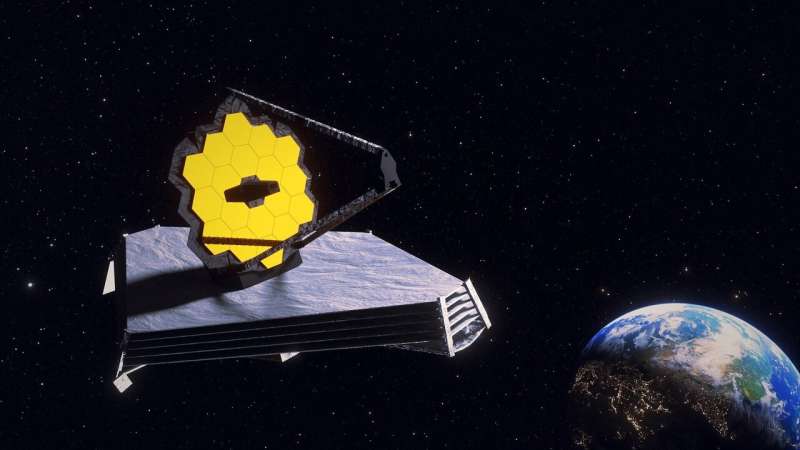
Think only professional astronomers will have access to the James Webb Space Telescope? Think again!
Three citizen scientists—members of the public—have discovered new astronomical objects that Webb will soon view. One of these volunteers is a co-investigator on a winning Webb proposal.
Later today, NASA, in partnership with the European Space Agency and the Canadian Space Agency, will release the first full-color images and spectroscopic data from the James Webb Space Telescope. But long before then, citizen scientists at Backyard Worlds: Planet 9 were working hard to find new nearby objects that Webb could follow-up. The citizen scientists who discovered Webb targets all work on this citizen science project.
"Even though the process was occasionally painstaking, it was worth it," said Arttu Sainio, who discovered a new object that Webb will examine. Sainio's discovery is a "brown dwarf," a ball of gas too cool to be considered a star, a key to understanding exoplanets. "I end up discovering hundreds of brown dwarf candidates and many of them have been followed up and researched." Citizen scientists Melina Thevenot and Dan Caselden also discovered brown dwarfs Webb will study.
Webb captures dying star's final 'performance' in fine detail
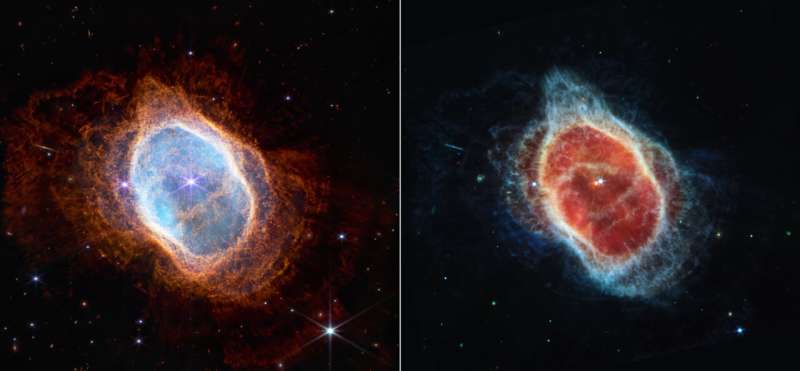
Some stars save the best for last.
The dimmer star at the center of this scene has been sending out rings of gas and dust for thousands of years in all directions, and NASA's James Webb Space Telescope has revealed for the first time that this star is cloaked in dust.
Two cameras aboard Webb captured the latest image of this planetary nebula, cataloged as NGC 3132, and known informally as the Southern Ring Nebula. It is approximately 2,500 light-years away.
Webb will allow astronomers to dig into many more specifics about planetary nebulae like this one—clouds of gas and dust expelled by dying stars. Understanding which molecules are present, and where they lie throughout the shells of gas and dust will help researchers refine their knowledge of these objects.
This observation shows the Southern Ring Nebula almost face-on, but if we could rotate it to view it edge-on, its three-dimensional shape would more clearly look like two bowls placed together at the bottom, opening away from one another with a large hole at the center.
Webb reveals cosmic cliffs, glittering landscape of star birth
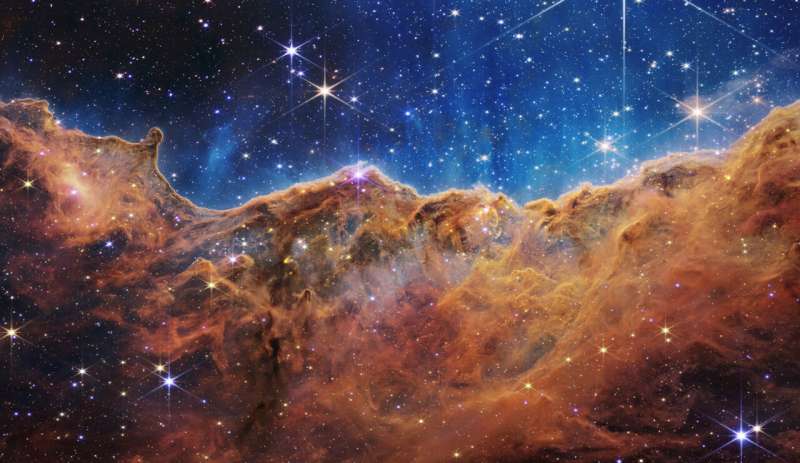
This landscape of "mountains" and "valleys" speckled with glittering stars is actually the edge of a nearby, young, star-forming region called NGC 3324 in the Carina Nebula. Captured in infrared light by NASA's new James Webb Space Telescope, this image reveals for the first time previously invisible areas of star birth.
Called the Cosmic Cliffs, Webb's seemingly three-dimensional picture looks like craggy mountains on a moonlit evening. In reality, it is the edge of the giant, gaseous cavity within NGC 3324, and the tallest "peaks" in this image are about 7 light-years high. The cavernous area has been carved from the nebula by the intense ultraviolet radiation and stellar winds from extremely massive, hot, young stars located in the center of the bubble, above the area shown in this image.
The blistering, ultraviolet radiation from the young stars is sculpting the nebula's wall by slowly eroding it away. Dramatic pillars tower above the glowing wall of gas, resisting this radiation. The "steam" that appears to rise from the celestial "mountains" is actually hot, ionized gas and hot dust streaming away from the nebula due to the relentless radiation.
NASA Reveals Webb Telescope’s First Images of Unseen Universe
 The dawn of a new era in astronomy has begun as the world gets its first look at the full capabilities of NASA’s James Webb Space Telescope, a partnership with ESA (European Space Agency) and CSA (Canadian Space Agency).
The dawn of a new era in astronomy has begun as the world gets its first look at the full capabilities of NASA’s James Webb Space Telescope, a partnership with ESA (European Space Agency) and CSA (Canadian Space Agency). La NASA revela las primeras imágenes del telescopio Webb de un universo nunca antes visto
 El amanecer de una nueva era en la astronomía ha comenzado mientras el mundo ve por primera vez las capacidades completas del telescopio espacial James Webb de la NASA, en asociación con la Agencia Espacial Europea (ESA, por sus siglas en inglés) y la Agencia Espacial Canadiense (CSA, por sus siglas en inglés).
El amanecer de una nueva era en la astronomía ha comenzado mientras el mundo ve por primera vez las capacidades completas del telescopio espacial James Webb de la NASA, en asociación con la Agencia Espacial Europea (ESA, por sus siglas en inglés) y la Agencia Espacial Canadiense (CSA, por sus siglas en inglés). Webb reveals steamy atmosphere of distant planet in exquisite detail
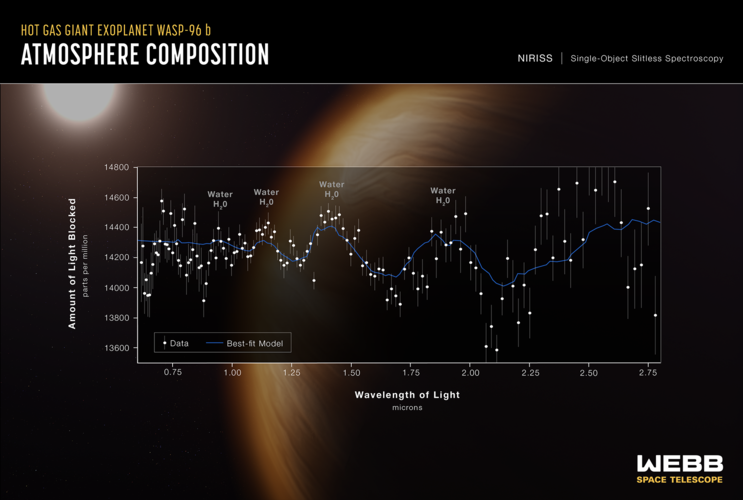
Webb’s enormous mirror and precise instruments joined forces to capture the most detailed measurements of starlight filtering through the atmosphere of a planet outside our Solar System to date.
The spectrum of light – which contains information about the makeup of a planetary atmosphere 1,150 light-years away – reveals the distinct signature of water. The strength of the signal that Webb detected hints at the significant role the telescope will play in the search for potentially habitable planets in the coming years. Webb’s powerful new view also shows evidence of haze and clouds that previous studies
Webb captures dying star’s final ‘performance’ in fine detail
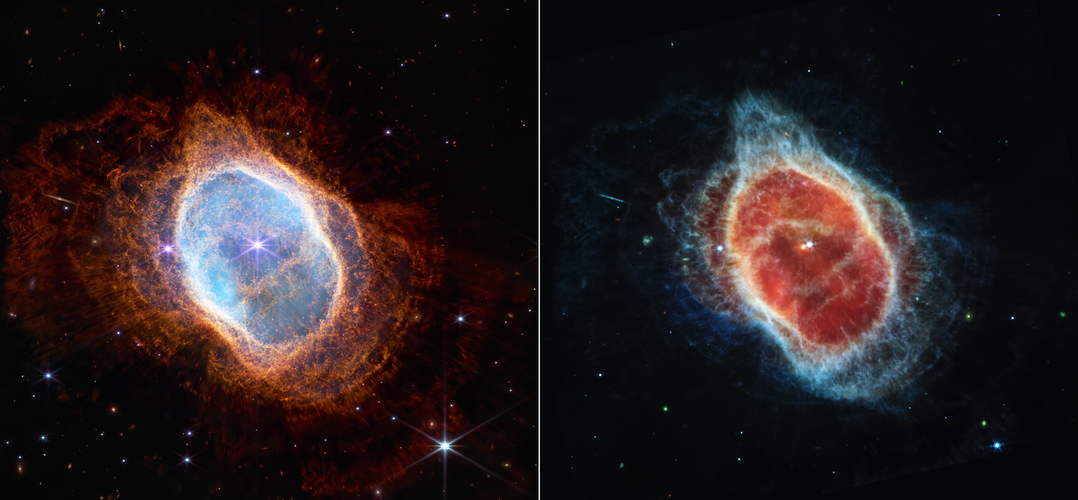
The NASA/ESA/CSA James Webb Space Telescope has revealed details of the Southern Ring planetary nebula that were previously hidden from astronomers.
Webb sheds light on galaxy evolution, black holes
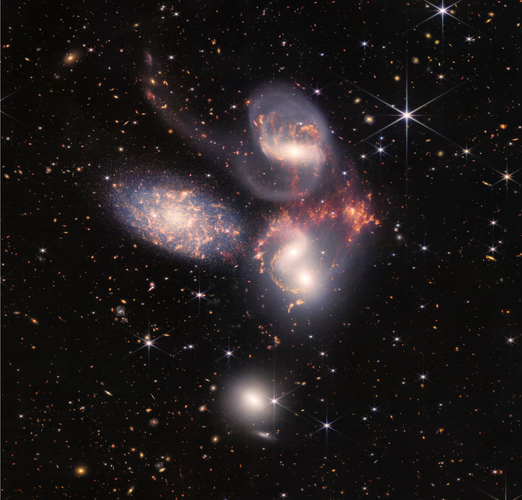
In this enormous new image, the NASA/ESA/CSA James Webb Space Telescope reveals never-before-seen details of the galaxy group “Stephan’s Quintet”.
Close proximity of the system gives astronomers a ringside seat to galactic mergers and interactions. Webb’s new image also shows in rare detail how interacting galaxies trigger star formation in each other and how gas in galaxies is being disturbed and the outflows driven by a black hole in Stephan’s Quintet in a level of detail never seen before. Tight galaxy groups like this may have been more common in the early Universe when superheated, infalling
First images from Webb telescope reveal unseen Universe
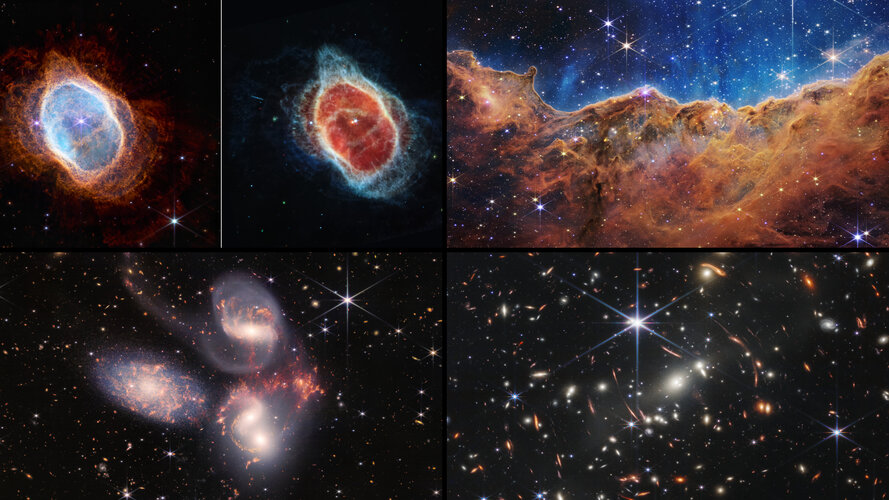
Highly anticipated observations hint at treasure trove of discoveries to come
The dawn of a new era in astronomy has begun as the world gets its first look at the full capabilities of the NASA/ESA/CSA James Webb Space Telescope. The telescope’s first full-colour images and spectroscopic data, which uncover a spectacular collection of cosmic features that have remained elusive until now, were released today.
Webb reveals “Cosmic Cliffs” – a glittering landscape of star birth

The NASA/ESA/CSA James Webb Space Telescope reveals emerging stellar nurseries and individual stars in Carina Nebula that were previously obscured.
The new images showcase how Webb’s cameras can peer through cosmic dust, shedding new light on how stars form. Objects in earliest, rapid phases of star formation difficult to capture, but Webb’s extreme sensitivity, spatial resolution, and imaging capability can chronicle these elusive events.
